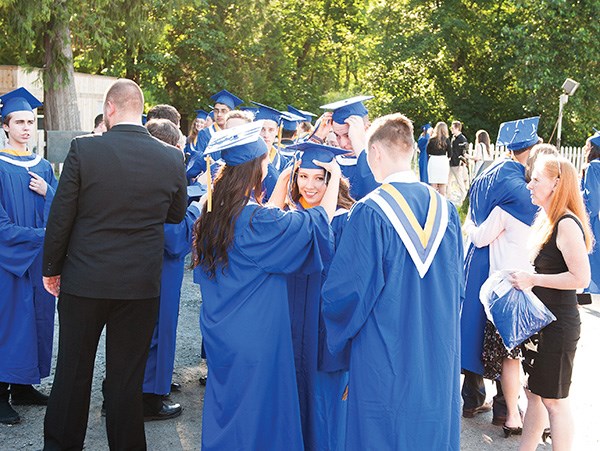High school students following in the footsteps of this month’s grads will be taking a slightly different path.
Starting in September, future graduates will face different requirements to meet before they can receive their diploma.
At this month’s school board meeting, the Sea to Sky School District’s director of instruction Peter Jory outlined what the changes at the provincial level will mean to students.
The most notable change that the province announced in May was a move away from the standardized government examinations for several subjects that students have been writing for decades. Instead, they will write provincial literacy and math skills examinations as a prerequisite for graduation.
The changes will be phased in over a couple of years, meaning students entering Grade 10 this fall will have to write the literacy and math tests, those going into Grade 11 will write the literacy but not the math exam and Grade 12 students will write neither.
“There’s a little bit of fine-tuning that needs to go on,” Jory told the board. “There’s no rush to go to the new program. It gives us time to plan.”
The Ministry of Education is also bringing in a new curriculum. While it emphasizes core skills such as reading, literacy and math, it also encourages more individualized learning, with an emphasis on collaboration, creativity and critical thinking. This is often described as “deeper learning,” which allows students to pursue their interests on projects.
Teachers have been testing the new curriculum this past year from kindergarten to Grade 9, and this fall, Grade 10 to 12 teachers will introduce it on a trial basis.
Steve Lloyd, the president of the Sea to Sky Teacher Association, expressed some concerns about the changes around the curriculum.
“I noticed in the district budget no funding from the ministry,” he said.
He also said the B.C. Teachers’ Federation has had issues with the pace of change and hopes that the province slows down the process.
“There’s been no opportunity to do any planning,” he said. “It’s all being implemented at the same time.”
Still, Lloyd says the teachers’ union views the end of the provincial examinations as a good sign.
“There’s some positive aspects to this as well,” he said
One question arising at the board meeting was about the extent to which post-secondary institutions are adapting to the changes in the curriculum and graduation requirements for secondary school students.
“They’ve been in on the conversation,” Jory said. “They’re integrating the changes.”
Vice-chair Laura Godfrey asked whether the institutions are taking the changes into account or would still rely on the percentage marks for students coming out of Grade 12.
Superintendent Lisa McCullough responded that post-secondary institutions are also trying to incorporate changes at the same time as trying to attract students from other provinces and countries, although institutions have been taking the new Ministry of Education requirements into account.
“They’ve been at the table through all of this work,” she said.
The provincial government has more information on the new graduation requirements and curriculum at curriculum.gov.bc.ca/graduation-info.



